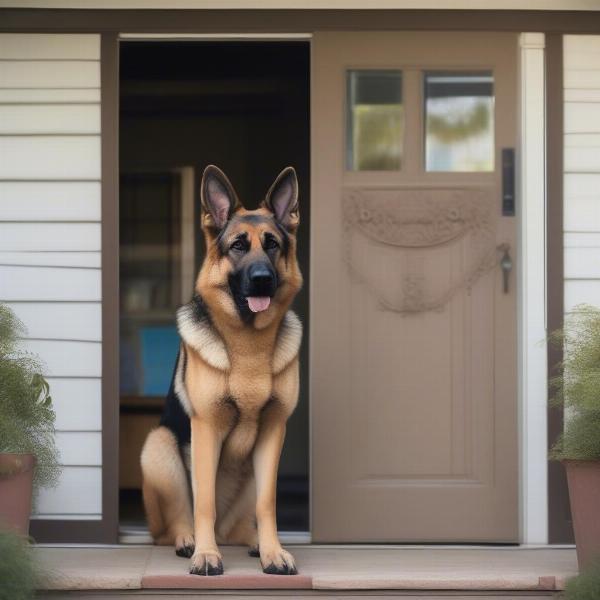German Shepherds are renowned for their intelligence, loyalty, and protective instincts, making them a popular choice for those seeking a guard dog. But are German Shepherds really good guard dogs? The short answer is: yes, with the right training and socialization. This article delves into the qualities that make German Shepherds excellent guard dogs, the training they require, and important considerations before bringing one into your home for protection.
The Guard Dog Qualities of a German Shepherd
Several inherent traits contribute to the German Shepherd’s effectiveness as a guard dog. Their imposing size and appearance can be a deterrent in itself. Coupled with a naturally protective nature towards their family and territory, this breed is predisposed to guarding. German Shepherds are also known for their intelligence and trainability, which are crucial for shaping their protective instincts into controlled and effective guarding behaviors. Their alertness and attentiveness mean they’re quick to notice anything unusual, and their courage allows them to confront threats when necessary.
 German Shepherd Guarding Home
German Shepherd Guarding Home
Training Your German Shepherd for Protection
While German Shepherds have natural guarding tendencies, proper training is essential to ensure they become reliable and safe guard dogs. Basic obedience training is the foundation, teaching commands like “sit,” “stay,” “come,” and “down,” which are essential for control and responsiveness. Advanced training can then focus on specific guarding behaviors, such as barking on command, releasing on command, and differentiating between friend and foe. It’s highly recommended to seek professional guidance from a certified dog trainer experienced in protection training.
Is a German Shepherd the Right Guard Dog for You?
Before deciding if a German Shepherd is the right guard dog for you, consider your lifestyle and experience with dogs. German Shepherds require consistent training, socialization, and exercise to thrive. They need a firm but fair owner who can establish clear boundaries and provide consistent leadership. Their intelligence and energy levels mean they need mental and physical stimulation to prevent boredom and destructive behaviors. If you’re a first-time dog owner, a German Shepherd might be a challenging breed to handle, especially for protection purposes.
Socialization: A Key Component for a Well-Rounded Guard Dog
Socialization is just as important as training for a German Shepherd guard dog. Exposing them to various people, places, and situations from a young age helps them develop appropriate social skills and discern real threats from harmless encounters. A well-socialized German Shepherd will be confident and less likely to exhibit fear-based aggression, making them more effective and reliable guardians.
Conclusion: A Loyal Protector with the Right Guidance
German Shepherds can indeed be excellent guard dogs. Their natural protective instincts, combined with proper training and socialization, make them loyal and effective guardians. However, potential owners must understand the commitment involved in raising and training a German Shepherd for protection. Consistent effort, professional guidance, and a focus on responsible ownership are crucial to ensuring a well-balanced and reliable guard dog.
FAQ:
- Do German Shepherds need special guard dog training? While they have natural instincts, specialized training is recommended for effective and safe guarding.
- Are German Shepherds aggressive? Not inherently, but poor socialization and training can lead to aggression.
- How much exercise does a German Shepherd need? They are an energetic breed requiring significant daily exercise.
- Are German Shepherds good with children? With proper socialization, they can be excellent family dogs, but supervision is always necessary.
- Can I train my German Shepherd myself for protection? While possible, professional guidance is highly recommended for optimal results and safety.
- Are there any health concerns specific to German Shepherds I should be aware of? Yes, hip and elbow dysplasia are common concerns.
- How do I find a reputable breeder for a German Shepherd? Research breeders thoroughly, looking for health testing, good socialization practices, and a focus on temperament.
Related Articles:
ILM Dog is your trusted resource for expert advice on dog breeds, health, training, nutrition, grooming, and more. We’re dedicated to helping dog owners worldwide provide the best possible care for their canine companions. From puppyhood to senior years, we offer practical tips and valuable insights to help you navigate every stage of your dog’s life. Contact us for personalized guidance and support: Email: [email protected], Phone: +44 20-3965-8624. Visit ILM Dog for more information on dog care, breed selection, and finding the perfect products for your furry friend. We specialize in helping you understand your dog’s unique needs and providing expert advice tailored to your situation.